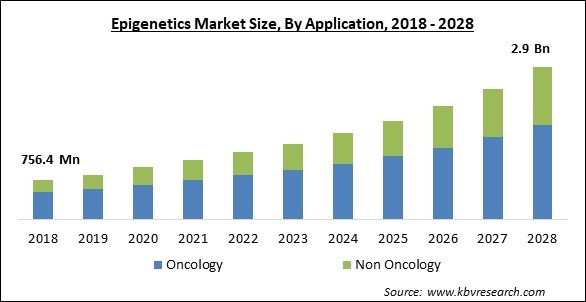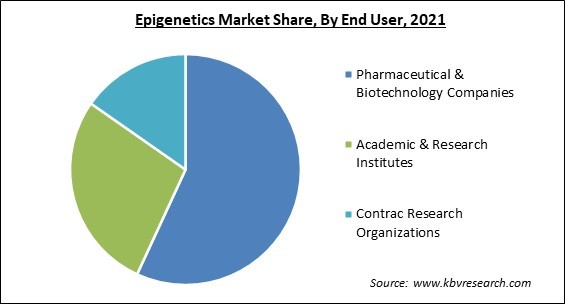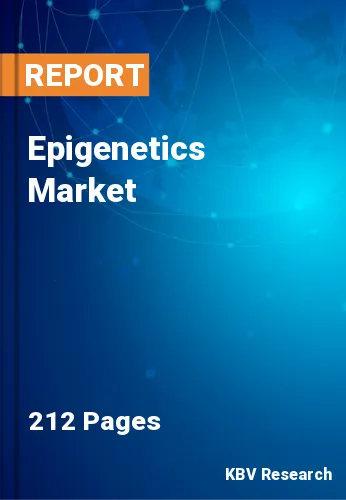The Global Epigenetics Market size is expected to reach $2.9 billion by 2028, rising at a market growth of 14.6% CAGR during the forecast period.
Epigenetics is a field of genetics that examines cellular and physiological feature changes produced by environmental or environmental variables that switch genes on and off and alter the cellular capacity to read genes without being influenced by genotype changes. Although the underlying DNA or RNA sequence stays unchanged, epigenetics produces changes in an organism's phenotype rather than genotype. Epigenetic alterations are important for development because they are dynamic and change in response to environmental stimuli.
Epigenetics is a cutting-edge field that focuses on discovering and tracking phenotypic changes in genes caused by chromosomal modifications without affecting the DNA sequence. Although other uses are growing, this field is most commonly associated with cancer research. Rising institutional and governmental collaboration, as well as financing for the development of innovative methods for disease detection and treatment, are expected to boost demand for epigenetics, hence propelling the market forward. For example, the University of Southampton and University Hospitals Southampton NHS Foundation Trust (UK) got USD 1.57 million (GBP 1 million) in February 2016 for cancer and infectious disease genetics and genomics research.
The growing global prevalence of cancer, as well as the growing use of epigenetics in non-oncology diseases, are two important factors driving the global epigenetics market. The number of cancer patients is expected to climb from 14.1 million in 2012 to 19.3 million by 2025, according to WHO projections. The number of new cancer cases in the United States grew to 1,688,780 in 2017 from 1,685,210 in 2016, according to the American Cancer Society.
Moreover, factors like growing cancer prevalence increased funding for healthcare research and development, and rising applications of non-oncological epigenetics would help the market to flourish more. According to Globocan 2020, there were 19, 292, 789 new cancer cases of various sorts recorded worldwide in 2020, with 9,958,133 cancer-related deaths. This global and widespread threat of cancer continues to be a significant driving force behind the development of new cancer therapies that aid in risk assessment, early diagnosis, and successful treatment monitoring.

Due to the importance of epigenetics in the COVID-19 research, Covid has had a substantial impact on epigenetics market growth. According to research published in Clinical Epigenetics in October 2020 titled "The epigenetic implication in coronavirus infection and therapy," epigenetic changes may play a key role in the emergence of coronavirus illness outcomes. Despite the fact that a variety of therapy alternatives are being examined, more research is urgently needed to find a viable vaccine or safer chemotherapeutic drugs, including epigenetic treatments, to combat this viral pandemic and develop pre-and post-exposure COVID-19 prophylaxis.
The epigenetics market is driven by DNA methylation, which is the covalent attachment of a methyl group to the cytosine ring, which inhibits transcription. Methylation-sensitive PCR is defined as sensitive bisulfite modification followed by PCR (MSP). Variations of MSP include real-time PCR for methylation detection, methyl light, and quantitative analysis of methylated alleles. Quantitative methods for DNA methylation are currently available, including allele-specific bisulphite sequencing, southern-based approach, bisulphite pyrosequencing, and bisulphite PCR followed by MALDI - TOF MS. Technological improvements are making it easier to assess locus-specific DNA methylation on a genome-wide scale, which is boosting market expansion.
The number of persons diagnosed with cancer has risen dramatically all around the world. The number of cancer patients is expected to climb from 14.1 million in 2012 to 19.3 million by 2025, according to WHO projections. Cancer is the second most common cause of mortality in the United States, accounting for approximately one out of every four deaths. According to the American Cancer Society, the number of new cancer cases in the United States is predicted to rise to 1,688,780 in 2017 from 1,685,210 in 2016, while the total number of cancer-related deaths is expected to rise to 600,920 from 595,690 in the same time period.
Epigenetics research instruments are expensive due to their extensive features and functions. Illumina's NovaSeq 5000 and 6000 sequencers, for example, were released in January 2017 and cost USD 850,000 and USD 985,000, respectively. The total cost of ownership is increased by maintenance and a range of other indirect expenditures, such as samples and consumables. Hence, many healthcare institutions are not prompt to embrace these instruments. Pharmaceutical companies and research institutes require several of these systems. As a result, large sums of money will be needed to purchase a number of high-priced genomic devices. End users with tight budgets, like academic research labs, have a hard time affording such systems.

Based on Application, the market is segmented into Oncology and Non-Oncology. In 2021, the Oncology segment acquired the maximum revenue share of the Epigenetics Market. This is due to a huge increase in cancer cases. The segment is expected to grow as the global prevalence of cancer rises, as well as the number of cancer-related deaths. Furthermore, the market is expected to grow due to the launch of new products and the potential commercialization of products already in the pipeline in the near future. Epimutations are epigenetic alterations that result in hypermethylation and epigenetic silencing. Epimutations have long been suspected of playing a role in cancer aetiology. Epimutations, specifically related to the silencing of tumor suppressor genes and the activation of oncogenes, are the subject of extensive research and development. Epimutations, unlike ordinary mutations, are reversible in nature.
Based on Product, the market is segmented into Kits, Reagents, Enzymes, and Instruments.The Reagents segment procured a significant revenue share of the Epigenetics Market in 2021. The most commonly utilized epigenetic reagents are histone and DNA modifiers. Antibodies, PCR reagents, primers, histones, electrophoresis reagents, nucleic acid analysis reagents, and buffers are some of the most common epigenetic reagents. PyroMark Q24 is a sophisticated reagent that uses advanced pyrosequencing chemistry to deliver much better real-time sequence-based detection and quantification than previously possible. The existence of a number of technology platforms makes gene, protein, and cellular analysis easier, which fosters worldwide market innovation.
Based on End User, the market is segmented into Pharmaceutical & Biotechnology Companies, Academic & Research Institutes, and Contract Research Organizations. In 2021, the Pharmaceutical & Biotechnology Companies segment acquired the biggest revenue share of the Epigenetics Market. This can be attributed to the R & D activities for drug resistance developed by microorganisms, oncology, molecular aspects of cancer, and drug discovery for non-oncology applications. Moreover, the growth of the segment would further be driven by the increased research in the fields of genetics with a strong focus on customized treatment.
| Report Attribute | Details |
|---|---|
| Market size value in 2021 | USD 1.1 Billion |
| Market size forecast in 2028 | USD 2.9 Billion |
| Base Year | 2021 |
| Historical Period | 2018 to 2020 |
| Forecast Period | 2022 to 2028 |
| Revenue Growth Rate | CAGR of 14.6% from 2022 to 2028 |
| Number of Pages | 212 |
| Number of Tables | 353 |
| Report coverage | Market Trends, Revenue Estimation and Forecast, Segmentation Analysis, Regional and Country Breakdown, Competitive Landscape, Companies Strategic Developments, Company Profiling |
| Segments covered | Product, Application, End User, Region |
| Country scope | US, Canada, Mexico, Germany, UK, France, Russia, Spain, Italy, China, Japan, India, South Korea, Singapore, Malaysia, Brazil, Argentina, UAE, Saudi Arabia, South Africa, Nigeria |
| Growth Drivers |
|
| Restraints |
|
Based on Regions, the market is segmented into North America, Europe, Asia Pacific, and Latin America, Middle East & Africa. In 2021, North America emerged as the leading region in the overall Epigenetics Market by collecting the maximum revenue share. This can be due to well-developed healthcare infrastructure, a wide range of modern epigenetics products, a big number of significant players, and well-trained medical personnel.
Free Valuable Insights: Global Epigenetics Market size to reach USD 2.9 Billion by 2028

The major strategies followed by the market participants are Partnership. Based on the Analysis presented in the Cardinal matrix; Thermo Fisher Scientific, Inc. is the major forerunner in the Epigenetics Market. Companies such as PerkinElmer, Inc., Agilent Technologies, Inc. and Active Motif, Inc. are some of the key innovators in the Market.
The market research report covers the analysis of key stake holders of the market. Key companies profiled in the report include Abcam plc, Agilent Technologies, Inc., Hologic, Inc., Illumina, Inc., Merck Group, PerkinElmer, Inc., Qiagen N.V., Thermo Fisher Scientific, Inc., Zymo Research, and Active Motif, Inc.
By Application
By Product
By End User
By Geography
The epigenetics market size is projected to reach USD 2.9 billion by 2028.
Increasing incidences of cancer are increasing are driving the market in coming years, however, the massive cost of Instruments and the high need for standardization and clinical validation growth of the market.
Abcam plc, Agilent Technologies, Inc., Hologic, Inc., Illumina, Inc., Merck Group, PerkinElmer, Inc., Qiagen N.V., Thermo Fisher Scientific, Inc., Zymo Research, and Active Motif, Inc.
The Content segment acquired maximum revenue share in the Global Enterprise Information Archiving Market by Component 2021, thereby, achieving a Market value of $12.8 billion by 2028.
The On-premise segment is leading the Global Enterprise Information Archiving Market by Deployment Type 2021, thereby, achieving a Market value of $9.3 billion by 2028.
The North America is the fastest growing region in the dominated the Global Enterprise Information Archiving Market by Region 2021, and would continue to be a dominant Market till 2028.
Our team of dedicated experts can provide you with attractive expansion opportunities for your business.

